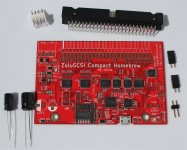I am going to post this here as it has to do with my pdp-11/84. I have an older SCSI2SD board (green v3.0). It works fine with the 5.0 firmware. Yet, I can't seem to get it to save new settings.
I have not played with this in some time, so have likely forgotten how. I tried some things, but they do not take. After quitting SCSI2SD or unpowering the old settings come back. The newer v6 does not even see my card. Trying to move the SCSI id's down as I am using a real HD with 4 (2GB partitions?) on the SCSI2SD. I "saved" the setttings to an XML file. Then tried to load from there. Wrote to the hardware and I see a nice progress in the status box. But still my settings do not save. Maybe this was a bug back in the day of the "green" boards? I do not know. What I am trying to do is to write my MSCP image from being created by xxdpdir.pl from AK6DN (thank you). It boots on Simh and XXDP runs. So I think the image is good. Running the OKDAG0 diag fails as expected as Simh doesn't "do" cache. So I wish to write this image to a real SCSI disk (2GB). My newer machines do not easily allow plugging in an older PCI Adaptec card. I had one machine where it worked with an PCI adaptor. But on my current machine it plugged in and the system booted, but the mouse was non functional which was really odd. I assumed it was some IRQ conflict. So now putting the Adaptec into my old Gateway-2000 and trying to install Slackware 12. I got it to boot, but did not qet a prompt to install to a HD. The Gateway normally has FreeDOS installed and I doubt it can DD an image. Thanks for any suggestions for the SCSI2SD.
I have not played with this in some time, so have likely forgotten how. I tried some things, but they do not take. After quitting SCSI2SD or unpowering the old settings come back. The newer v6 does not even see my card. Trying to move the SCSI id's down as I am using a real HD with 4 (2GB partitions?) on the SCSI2SD. I "saved" the setttings to an XML file. Then tried to load from there. Wrote to the hardware and I see a nice progress in the status box. But still my settings do not save. Maybe this was a bug back in the day of the "green" boards? I do not know. What I am trying to do is to write my MSCP image from being created by xxdpdir.pl from AK6DN (thank you). It boots on Simh and XXDP runs. So I think the image is good. Running the OKDAG0 diag fails as expected as Simh doesn't "do" cache. So I wish to write this image to a real SCSI disk (2GB). My newer machines do not easily allow plugging in an older PCI Adaptec card. I had one machine where it worked with an PCI adaptor. But on my current machine it plugged in and the system booted, but the mouse was non functional which was really odd. I assumed it was some IRQ conflict. So now putting the Adaptec into my old Gateway-2000 and trying to install Slackware 12. I got it to boot, but did not qet a prompt to install to a HD. The Gateway normally has FreeDOS installed and I doubt it can DD an image. Thanks for any suggestions for the SCSI2SD.

